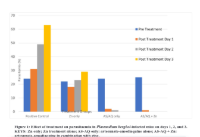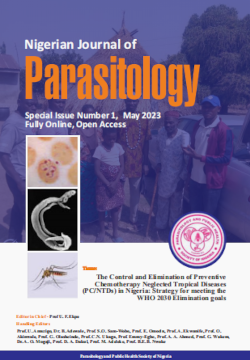Efficacy of Co-Administration of Zinc Supplement and Artesunate- Amodiaquine in the Treatment of Malaria-Infected Mice
DOI:
https://doi.org/10.4314/njpar.v46i1.8Keywords:
Artesunate amodiaquine, oxidative stress, Plasmodium berghei, Parasitaemia, Toxicity, Zinc supplement.Abstract
Artemisinin-based combination therapies (ACTs), such as AS-AQ, are recommended by the WHO for malaria treatment and are sometimes co-administered with antioxidants to reduce oxidative stress, although these agents may interfere with the treatment. This study investigated the effects of zinc supplementation on the antimalarial efficacy of artesunate-amodiaquine (AS-AQ) in mice infected with Plasmodium berghei. In this experiment, 25 mice were divided into five groups: negative control (uninfected), positive control (infected,untreated), and three treatment groups (zinc only, AS-AQ only, and AS-AQ with zinc). Parasitaemia was induced, and the treatments were administered daily for three days. One-way Analysis of Variance (ANOVA) was used to analyse the data. Results showed that AS-AQ alone cleared the parasite by day two, with a 100% survival rate and improved blood parameters. AS-AQ combined with zinc also cleared the parasite but had a lower survival rate (40%), indicating potential toxicity of the combination despite the maintained antimalarial efficacy. Zinc alone did not effectively control parasitaemia. The study revealed that zinc supplementation did not alter the antiplasmodial efficacy of the ACT partner, and it may have displayed toxicity that affected the survival rate of mice. This suggests
that zinc supplementation does not have any beneficial effect as an antioxidant in the treatment of malaria infection, and its co-administration with ACTs may not be safe.
References
World Health Organization (2022). World Malaria Report 2022. Geneva: Licence: CC BY-NC-SA 3.0 IGO.
Kotepui, M., Wilairatana, P., Mala, W., Kotepui, K.U. Masangkay, F. R. & Wangdi, K. (2023). Effects of daily zinc alone or in combination with other nutrient supplements on the risk of malaria parasitaemia: a systematic review and meta-analysis of randomised controlled trials. Nutrients, 15: 2855. https:// Doi.Org/10.3390/Nu15132855.
Ebohon, O., Irabor, F. & Omoregie, E. S. (2021). Ascorbic acid co-administration with artesunate–amodiaquine, up
regulated antioxidant enzymes gene expression in bone marrow cells and elicited biochemical changes in Plasmodium
berghei infected mice, Springer Nature Applied Science, 3:6. https://doi.org/10.1007/s42452-020-04063-5.
Ekeh, F. N., Ekechukwu, N. E., Chukwuma, C. F., Ifeanyi, A. C., Chike, E. O. & Stanley, N. O. (2019). Mixed vitamin C and zinc diet supplements co-administered with artemether drug improved haematological profile and survival of mice infected with Plasmodium berghei. Food Science and Human Wellness, 8:275–282. https://doi.org/10.1016/j.fshw.2019.05.003.
Organisation for Economic Co-operation and Development (2001). OECD guidelines for the testing of chemicals. Revised draft guidelines; pp.423.
World Health Organization (2016). MM-SOP-04: Preparation of Giemsa working solution.
Webster, S. H. & Liljegren, E. J. (1955). Organ: Body-weight ratios for certain organs of laboratory animals. III. White Swiss mouse. America Journal of Anatomy, 97(1): 129- 153. https://doi.org/10.1002/aja.1000970105
Aghahowa, S. & Okolocha, K. (2018). Comparative effects of parenteral antimalarials in swiss albino mice after
chronic exposure to Plasmodium berghei. Animal Models and Experimental Medicine, 1:235–241. https://Doi.Org/10.1002/ Ame2.12029.
Arise, R. O., Sunday-Nwaso, E., Farohunbi, S. T., Nafiu, M. O. & Adedibu, C. T. (2017). Mechanochemical synthesis in vivo anti-malarial and safety evaluation of amodiaquine-zinc complex. Acta Facultatis Medicae Naissensis. Doi: 10.1515/afmnai-2017-0024 udc: 615.283:616.936.
Akintunde, J. K., Ajiboye, J. A., Siemuri, E. O. & Olabisi, O. O. (2021). Fansidar drug induces cytotoxicity in some vital tissues in a rat model: combination defensive effect of selenium and zinc capsules. Therapeutic Advances in Drug Safety, 12: 1–13. Doi: 10.1177/ 20420986211027101.
Ajayi, A. M., Adebanjo, M. I. & Ademowo, O. G. (2023). Vitamin C rich juice co administration with artemether-
lumefantrine ameliorates oxido inflammatory responses in Plasmodium berghei- infected mice. Parasitology Research.
https://Doi.Org/10.1007/S00436-023-07885-5.
Udeme, O. G. & Ebong, O. O. (2012). A comparative study on the efficacy of some artemisinin combination therapies on Plasmodium berghei in swiss albino mice. Pharmacology & Pharmacy, 3: 109-112. http: //Dx.Doi.Org/10.4236/Pp.2012.31016. http://Www.Scirp.Org/Journal/Pp.
Rahfiludin, M. Z. & Ginandjar, P. (2013). The effect of zinc and vitamin C supplementation on haemoglobin and hematocrit levels and immune response in patients with Plasmodium vivax malaria. Southeast Asian Journal of Tropical Medicine Public Health, 44: 5. pp 733-739. PMID: 24437307
Iribhogbe, O. I., Agbaje, E. O., Oreagba, I. A., Aina, O. O. & Ota, A. D. (2012). Therapeutic potential of selected micronutrients in malaria: an in vivo study in Plasmodium berghei infected mice. Biology and Medicine, 4(4). pp 193- 202. Gale Academic OneFile,
link.gale.com/apps/doc/A357969054/AONE?u=anon~889a868&sid=googleScholar&xid=1894e1c5. Accessed 10 Dec. 2024.
Chapman, J., Goyal, A. & Azevedo, A. M. (2023). Splenomegaly. In StatPearls. StatPearls Publishing. PMID:28613657.

Downloads
Published
How to Cite
Issue
Section
License
Copyright (c) 2025 Nigerian Journal of Parasitology

This work is licensed under a Creative Commons Attribution-NonCommercial-NoDerivatives 4.0 International License.




